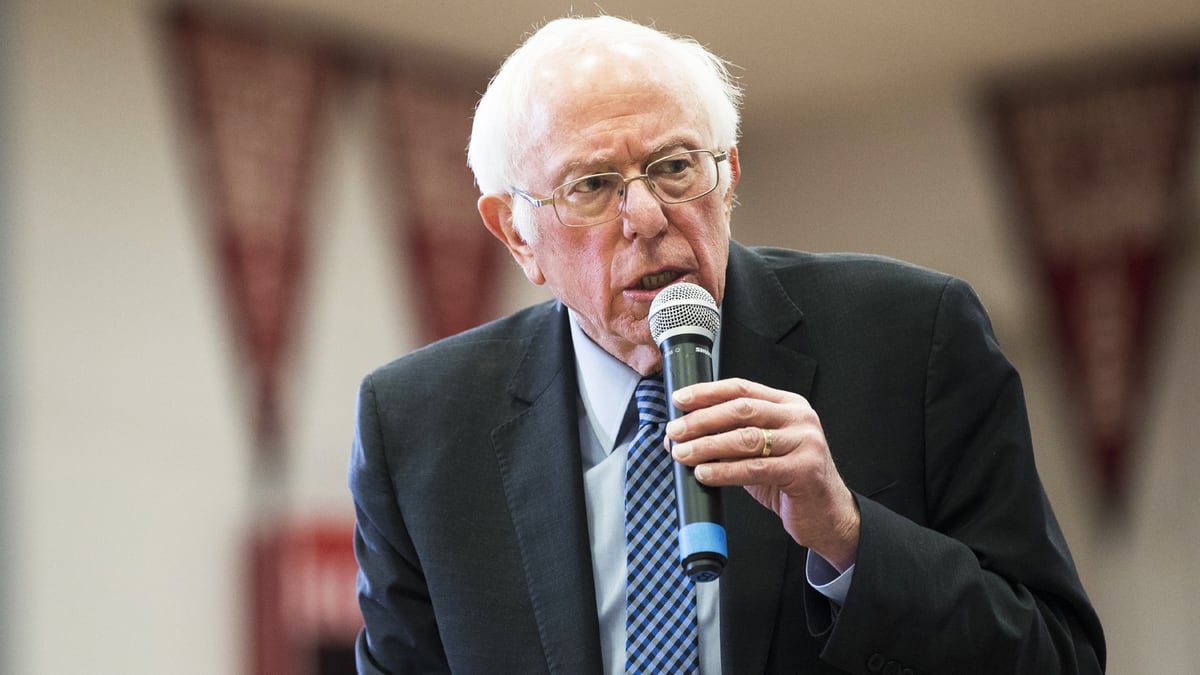Bernie Sanders on Wednesday raised the possibility that social media accounts harassing his critics may, in fact, be Russian bots operating in disguise. But top security officials say they've seen no such activity. The platforms themselves hinted the same. And experts in the field are now saying that the senator's inference may cause harm by eroding trust for when such behavior does, in fact, occur.
When pressed about his supporters’ attacks on members of the Nevada Culinary Workers Union and its decision not to endorse Sanders’ signature Medicare for All health care policy, Sanders raised the specter of Russian intelligence activity. He said it wasn’t “too paranoid” to recall Russian meddling in 2016. “I’m not saying that’s happening, but it would not shock me.”
The debate night comment marked the second time Sanders has alluded to the possibility of Russian disinformation stoking his online supporters’ alleged toxicity. In a CNN town hall two days prior, Sanders used a similar variation of the talking point when challenged over the Nevada issue. “And I don’t—you know, want to be overly paranoid here—is that, you know, we live in a crazy time. And there are a lot of folks out there who do bots and all this other thing. I saw some of those things. And there are people out there who want to divide the progressive movement.”
In response to questions from The Daily Beast, Twitter didn’t specifically weigh in on whether or not there’s evidence to back up the suggestion of Russian involvement in the feud over the Culinary Workers Union. But the company did issue a statement that said its employees “proactively monitor Twitter to identify attempts at platform manipulation and mitigate them” and that “if we have reasonable evidence of state-backed information operations, we’ll disclose them following our thorough investigation to our public archive—the largest of its kind in the industry.”
The company has notably not disclosed any state-backed operations targeting the Nevada union. The most recent example of Twitter’s identification of Russian personas dates to four accounts linked to the Internet Research Agency taken down in June of 2019—months before the issue of Nevada union support for Sanders’ health care plan became a contentious issue.
The Sanders campaign did not respond to requests for comment from The Daily Beast. But on Friday it released a statement after The Washington Post reported that U.S. intelligence had briefed Sanders that Russia was attempting to support his campaign. The Post story did not specify what form the assistance was taking or when it may have taken place.
“Unlike Donald Trump, I do not consider Vladimir Putin a good friend. He is an autocratic thug who is attempting to destroy democracy and crush dissent in Russia. Let’s be clear, the Russians want to undermine American democracy by dividing us up and, unlike the current president, I stand firmly against their efforts, and any other foreign power that wants to interfere in our election," Sanders said in a statement. “I don't care, frankly, who Putin wants to be president. My message to Putin is clear: stay out of American elections, and as president I will make sure that you do."
When asked to respond to Sanders’ comments about the possibility of Russian personas involved in the attacks, Bethany Khan, a spokesperson for the Nevada culinary union, wrote in an email that “I will not be spending any time being dismissed or gaslighted about my experiences.”
Khan wrote that she’d been inundated with so many abusive comments that she hadn’t had time to collect them, but pointed to an interview she conducted with the Nevada Independent detailing some of the abuse. “There is so much more examples from ROSE Twitter than what I’ve had time to share, but I remain focused on doing the important GOTV work to ensure Culinary Union members have a chance to early vote/caucus.”
The Daily Beast reached out to experts in tracking disinformation to see if there was any evidence of Russian involvement in the feud between Sanders supporters and the Nevada Culinary Workers Union. None could point to a specific example of Russia-linked personas imitating pro-Bernie personas and attacking members of the Nevada Culinary Workers Union.
Ben Nimmo, director of investigations at the disinformation-tracking firm Graphika, told The Daily Beast that, after 2016, Russian trolls have tried harder to stay undetected, making finding them a tricky process.
“Actually proving that a particular account is run from Russia means crossing a high evidence bar. There are far more accusations of ‘Russian trolls’ or ‘Russian bots’ going around than there are actual known Russian assets that have been taken down.”
Oftentimes, Russian covert operations on social media act as echo chambers for the issues and priorities of overt Russian propaganda outlets like Sputnik and RT. Jessica Brandt, director of research at the Alliance for Securing Democracy, which tracks Russian state news trends and disinformation, said Russian outlets haven’t made much of the Nevada union feud.
“We’ve seen no evidence of that,” she told The Daily Beast, adding that the Alliance’s dashboard for tracking overt Russian propaganda turned up only one story on the Nevada issue.
There is evidence, however, that Sanders supporters’ penchant for attacking other Democrats, outside the recent feud over the Nevada caucuses, is driven primarily by authentic American actors and not foreign state trolls. #NeverWarren and #MayorCheat are among the most popular hashtags used by Sanders supporters on Twitter to go after his Democratic rivals—the latter a reference to the unsupported claim that former Mayor Pete Buttigieg “stole” the Iowa Caucuses.
“When I looked at those hashtags, they looked like they were launched and pushed by American users, some of them even American users with verified accounts,” Nimmo told The Daily Beast. “There wasn't any evidence there to suggest that they were started or substantially pushed by Russian trolls.”
State disinformation actors have, at times, mimicked supporters. Graphika found four Instagram accounts purporting to be Bernie supporters linked to Russian disinformation actors operating in the fall of 2019 and FireEye found Iran operated a fake social media persona, “berniecratss,” posing as a Sanders supporter.
None of the accounts in those campaigns appeared to have engaged in the kind of toxic intra-party feuding Sanders supporters are often accused of. The Instagram accounts, run by the Internet Research Agency troll farm, appear to have been primarily interested in posting memes about criminal justice rather than engaging with or attacking Democrats. The top ten hashtags associated with the Iranian-run berniecratss account found by FireEye were all associated with either anti-Trump or anti-Israel sentiments.
It’s not out of the realm of possibility that Russia, Iran, or any other interested country could decide to meddle. That’s why experts say it’s important for Sanders and other candidates to steer clear of accusations about foreign meddling in the admitted absence of any evidence to support them.
“I think it's completely irresponsible to even allude that there's been some sort of attack from a foreign actor to undermine our democracy. Yes, we know this is happening. Yes, we know that the intelligence community and others are working around the clock to detect and mitigate it,” Lisa Kaplan, who runs the Alethea Group, told The Daily Beast. “But if you don't have evidence, it's an irresponsible statement to make and it's not increasing trust in the system.”
“In this case, Senator Sanders dismissing the online bullying and harassment by some of his purported supporters by suggesting it was ‘Russian interference’ does the opposite of solving either serious challenge,” said Graham Brookie, director of the Atlantic Council’s Digital Forensic Research Lab.
Sanders isn’t the first Democratic presidential candidate to raise the possibility of a Russian attack on his campaign without any supporting evidence. In the summer of 2019, former 2020 candidate Sen. Kamala Harris responded to a question about the possibility of Russian disinformation personas attacking her campaign by saying “Oh, we already know we are.”
Like Sanders, Harris wasn’t able to produce any specific evidence of Russian involvement in the attacks.


